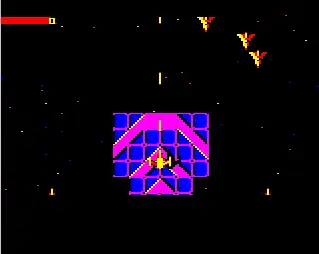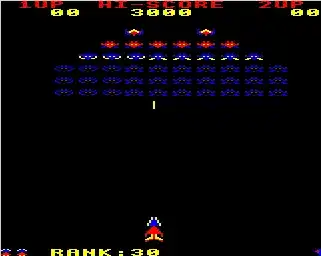beebgames.com
Last Updated 12th May 2024
The BBC Games Archive - digital memories
beebgames.com
Interview With Nick Pelling, AKA Orlando M Pilchard
I recently tracked down Orlando/Nick, he now lives in Orlando, 10 Orlando Place, Orlando Drive! Well, maybe he doesn't, but it kinda makes it sound like I've worked harder doesn't it :))
Anyway, he was kind enough to let me ask him some questions, so, here goes, an interview with one of the all-time great programmers, enjoy!
If you have any comments please contact me.
How did you get into computers, and what drew you to the Acorn machines?

I bought an Acorn Atom while at school, which I kept expanding by another half-a-K with any spare pocket money I had (RAM cost a fortune, BTW). I published a Galaxians-style game and advertised in the back of Your Computer back in April 1982. Acornsoft then phoned me up, said come to Cambridge and do the same game on the BBC (which turned out to be Arcadians) - I walked out of there with a brand-new BBC under my arm. It turned out not to have a serial ULA in, so I couldn't record anything to tape. I ended up keeping the machine turned on for a month, printing what I'd written, and then having to type it all in again.
So: low price and a "real keyboard" drew me to the Atom, but Acorn drew me to the BBC.
What was it you liked about the Acorn 8-bit machines that made you keep using them?
Familiarity and laziness. 8^) I liked 6502, and enjoyed inventing new tricks and techniques. I wrote many demos that pushed the machine in new ways - like my Amiga Boing! demo (on the BBC) - but kept on finding new angles to explore.
Why did you choose to use a nickname Orlando M Pilchard instead of your real name?
Simple answer: I didn't like all the tabloid hype about games writers at the time ("he's got a Porsche - but he's too young to drive!!!!!"), which seemed very distasteful, especially as the reality was that most people in the industry had next to no money at all. So I wrote under a pseudonym and didn't give interviews.
Why did you decide to go solo with Aardvark software instead of staying with the big companies ie Superior or Acornsoft?
I'd started solo, and found I didn't enjoy working for Acornsoft. Rather: I liked the work, but didn't enjoy the working conditions. At one stage, I worked from 6pm to 8am so that I wasn't hassled by people phoning up trying to fix clashes between Acornsoft games and Computer Concepts' ROMs, nor by the constant grind of the daisy-wheel printer the other side of the partition.
How come you made comparatively few games compared to some other companies, who made a larger number of games, but never had the success you did?

I actually wrote many more game engines than I ever released games, but I only wanted to release complete games with a certain "X"-factor. And I wasn't really financially successful: I lost a pile of money when certain distributors went down, and never released half as many games as I should. I was young, I was definitely headstrong, and making money wasn't an instinctive thing to me.
What is your secret with games, how did you manage to make every game a success?
Writing plenty of bad ones and not releasing them. 8^) FireTrack was a fantastic game creatively, but hardly made a penny. Was that a "success"?
Do you have any regrets about anything you did on the 8-bitters?
- I should have finished more games.
- I should have dealt with Atari differently, and maybe Delos' Joust would have come out.
What was your best selling BBC game - and do you feel it was the best you did?
Numerically: Arcadians > 3DPool > Frak! > FireTrack > Zalaga. I don't know how many Acornsoft Chess sold, but it wasn't particularly great. FireTrack was my best technical achievement, but I like all of A/3DP/F!/FT/Z. FireTrack has the best interface and "feel", but its graphics seems very spartan these days.
So: probably FireTrack by a neck.
How do you think the face of gaming has changed since the early 80's, and do you like what has happened, or would you prefer it as it was back then?

They're completely different worlds. I had a certain amount of fun back then, but I was exceptionally poor more or less all of the time. These days I consult for gigantic international corporations (so the money's usually better), but I still manage to have strong creative and technical input to the projects I work on, which is quite fun.
I've said numerous times recently that I think the games industry's middle period is about to end, and that it's in transition to a new equilibrium. But I think I'll like writing games wherever the industry goes.
Is there anything you miss about the beeb family when you are programming for the latest 32 and 64 bit consoles?
All the problems we had back then - inadequate documentation, lack of RAM, second rate tools, second-rate support - never went away, they just got scaled up.
What advice would you give to programmers about games programming?
- Learn high-level/"formal" programming (and design) techniques and low-level/"grungy" assembler techniques: the best games programmers use (and break) both sets of rules according to context and need.
- Learn to work effectively as part of a team: ie, learn to get along with people. Games will continue to be written by teams for the foreseeable future.
- Understand sound and graphics, preferably by trying to make them yourself. Even if you aren't very good, you'll really appreciate what's involved.
- When designing commercial games, start from basic psychology, and answer the Single Important Question - "Why should I spend £40 on this game?" If you can't answer that, you shouldn't be writing it. 8^)
I hope you enjoyed this interview, and look out for more coming soon!!
(C)2024 C. Boylan